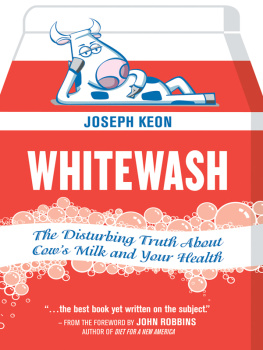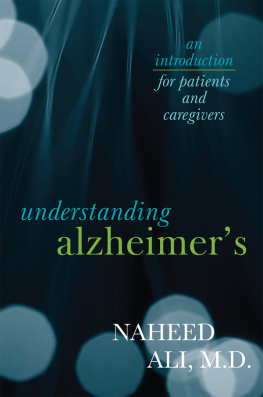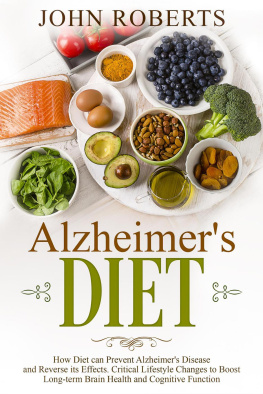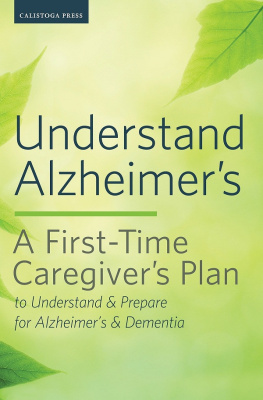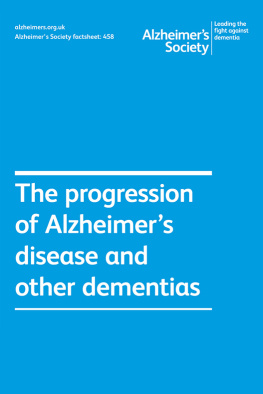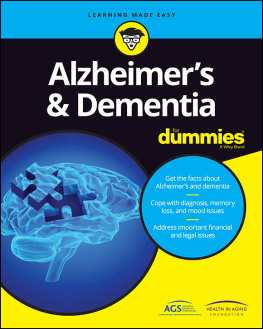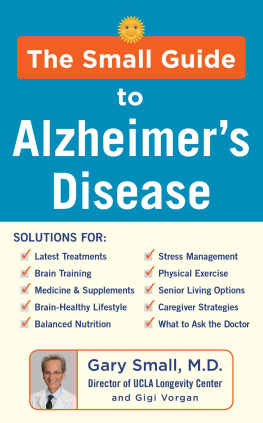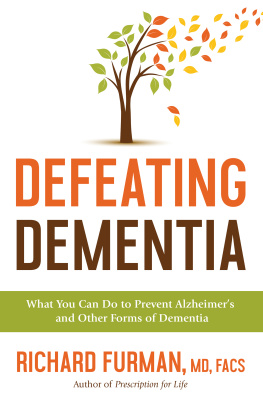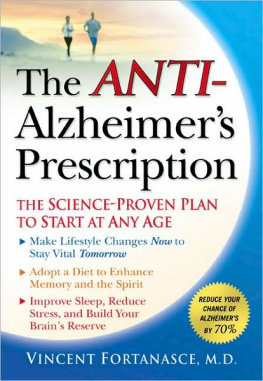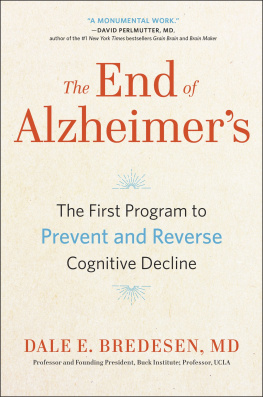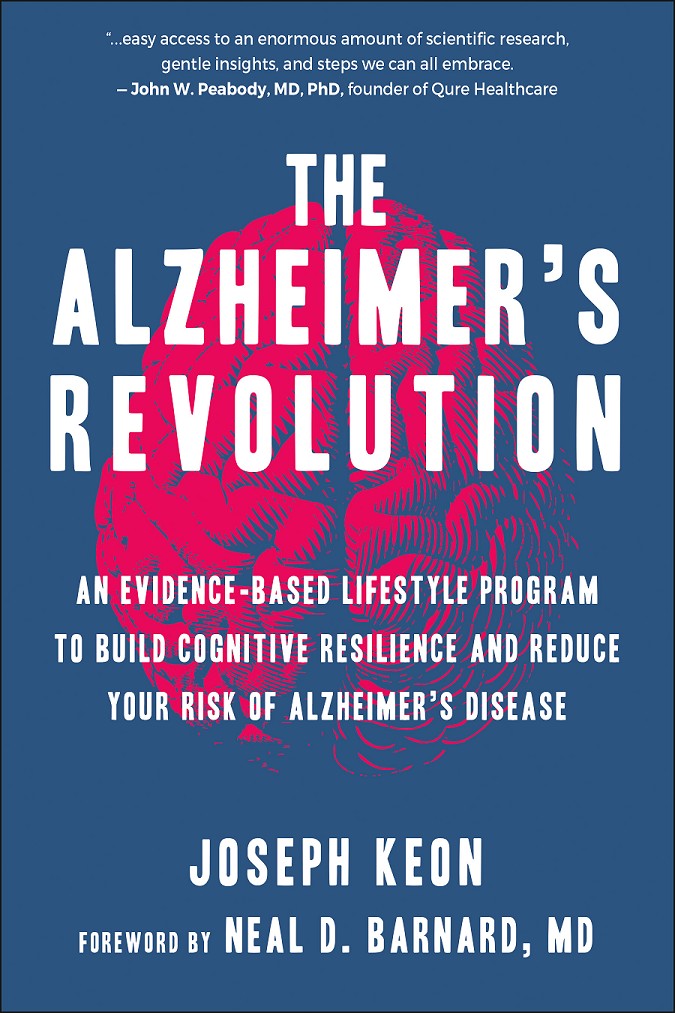Contents
| 1 |
|
| 2 |
|
| 3 |
|
| 4 |
|
| 5 |
|
| 6 |
|
| 7 |
|
| 8 |
|
| 9 |
|
| 10 |
|
| 11 |
|
| 12 |
|
| 13 |
|
| 14 |
|
| 15 |
|
| 16 |
|
| 17 |
|
| 18 |
|
| 19 |
|
| 20 |
|
| 21 |
|
| 22 |
|
| 23 |
|
| 24 |
|
| 25 |
|
| 26 |
|
| 27 |
|
| 28 |
|
| 29 |
|
| 30 |
|
| 31 |
|
| 32 |
|
| 33 |
|
| 34 |
|
Hatherleigh Press is committed to preserving and protecting the natural resources of the earth. Environmentally responsible and sustainable practices are embraced within the companys mission statement.
Visit us at www.hatherleighpress.com and register online for free offers, discounts, special events, and more.
THE ALZHEIMERS REVOLUTION
Text Copyright 2022 Joseph John Keon
Library of Congress Cataloging-in-Publication Data is available.
ISBN: 978-1-57826-944-0
All rights reserved. No part of this book may be reproduced, stored in a retrieval system, or transmitted, in any form or by any means, electronic or otherwise, without written permission from the publisher.
NOTE TO THE READER
Please do not make any adjustments to your diet, medications, or begin any type of exercise program without first consulting your personal physician. If you are experiencing memory problems, please let your healthcare provider know so that you can be properly assessed.
Maintaining order rather than correcting disorder is the ultimate principle of wisdom. To cure a disease after it has manifest is like digging a well when one feels thirsty or forging a weapon when the war has already begun.
Yellow Emperor of China

All scientific work is incomplete... that does not confer upon us a freedom to ignore the knowledge we already have, or to postpone the action that it appears to demand at a given time.
Sir Austin Bradford Hill
Foreword
O ne of the most exciting breakthroughs in medicine in recent decades is the understanding that we can reduce our risk of developing Alzheimers disease. According to the best evidence we have, we can cut this risk easily and dramatically.
The findings came from carefully conducted research studies. Researchers tracked the diets of thousands of people over many years to see how foods, exercise, and other factors affect brain health. The Chicago Health and Aging Project, for example, took a close look at what people ate for breakfast, lunch, and dinner. They found that people who ate in certain healthful ways were much less likely to develop Alzheimers disease. But certain not-so-healthful foods turned out to be strongly linked to the loss of mental function.
One of the culprits identified by the Chicago researchers was something I knew a lot about. As a child growing up in the Midwest, I often woke up in the morning to the smell of bacon emanating from the kitchen. Running downstairs, I found my mother pulling bacon strips out of the fry pan with a fork and setting them onto a paper towel to cool. When the bacon was out of the pan, she carefully poured the bacon grease into a jar to save it. That jar did not go in the refrigerator. My mother just kept it on the shelf. Because as bacon cools, it turns into a waxy solid that does not need to be refrigerated. The next day, she would spoon the grease back into the pan to fry eggs (hold onto your coronary arteries!).
The fact that bacon grease is solid at room temperature is a sign that it is loaded with what doctors call saturated fatthat is, bad fat. Its called bad because it raises cholesterol levels. But the Chicago researchers also found a connection with Alzheimers disease. It turned out that people who generally avoid saturated fat cut their Alzheimers risk by more than half.
They made other findings. It also paid to avoid trans fats, which are sometimes used in snack foods. And vegetables, fruits, and foods rich in vitamin E, such as nuts and seeds, turned out to be protective.
Other research teams extended these findings. And they found that exercise can help, as well. As years went by, we have gained more and more knowledge on ways to prevent Alzheimers disease and to maintain brain health lifelong.
As you read through the practical steps in this book, let me encourage you to share them with others. So many people have had a parent or grandparent who succumbed to Alzheimers disease, and they fear that that fate awaits them as well. With the power you will gain from this book, you can help others to understand that there are steps they can take right now to gain a measure of protection for themselves and their families.
Neal D. Barnard, MD, FACC
Adjunct Faculty, George Washington University School of Medicine President, Physicians Committee for Responsible Medicine Washington, DC
ENDNOTES
Aune, D., et al., Dairy products, calcium, and prostate cancer risk: a systematic review and meta-analysis of cohort studies, American Journal of Clinical Nutrition 101 (2015):87-117.
The Fort Wayne Sentinel Edison Hails Era of Speed, 31 December 1902 (p. 49).
Rocca, Walter A., et al., Risk of Cognitive Impairment or Dementia in Relatives of Patients with Parkinson Disease, Archives of Neurology 64 (2007):1458-64.
.
Rizzi, Liara, et al., Global Epidemiology of Dementia: Alzheimers and Vascular Types, BioMed Research International 2014 (2014):908-915.
Pritchard, C., et al., Changing patterns of neurological mortality in the 10 major developed countries--1979-2010, Public Health 127 (2013):357-68; Pritchard, Colin, et al., Neurological deaths of American adults (5574) and the over 75s by sex compared with 20 Western countries 19892010: Cause for concern, Surgical Neurology International 6 (2015):123. 10.4103/2152-7806.161420
Early-onset dementia and Alzheimers diagnoses spiked 373 percent for generation X and millennials, Blue Cross Blue Shield Association, February 27, 2020; Early-onset Alzheimers rates grow for younger American adults, February 27, 2020.
Hebert, L. E, et al., Alzheimer disease in the United States (20102050) estimated using the 2010 census, Neurology 80 (2013):177883; James, B.D., et al., Contribution of Alzheimer disease to mortality in the United States, Neurology 82 (2014):1045-50.
.
Belluck, Pam, Dementia care cost is projected to double by 2040, New York Times April 3, 2013.
Hurd, Michael D., et al., Monetary costs of dementia in the United States, New England Journal of Medicine 368 (2013):132634.
Carlton, Lindsey, Could Alzheimers really bankrupt Medicare and Medicaid? FOX News, March 1, 2017.
Alzheimers Association, New Alzheimers Association report examines racial and ethnic attitudes on Alzheimers and dementia care, March 2, 2021.
Next page

